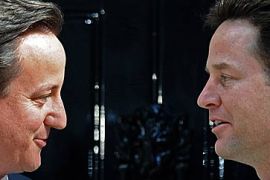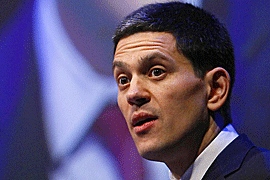Dramatic spectacle of UK election
Exciting campaign ends with coalition promising a “new style of politics”.

 |
| The Conservatives now have to team up with a party that many of its MPs have ridiculed [AFP] |
It’s hard to believe that it’s only a week since Britain went to the polls, changing the country and the way it’s run forever.
It has been a busy week, where the word extraordinary has often been used, but entirely appropriately.
And now Britain has a coalition government for the first time since 1945, an unlikely union which promises a new style of politics, but which critics predict will end in an early and messy divorce.
So now the dust has just about settled – here’s a look how the main parties fared and a glimpse at what the future might hold.
Conservative compromise
Now the biggest party of government, the main opposition Conservative party had to do a deal with the Liberal Democrats to secure the position of prime minister for David Cameron, its leader.
| special report |
|
Final results |
The party won a record number of seats, but still didn’t do enough to get the overall majority it desperately craved.
Agreeing to equal status for Nick Clegg, the Liberal Democrat leader, in the first televised leaders’ debates undoubtedly hurt the Conservatives.
Clegg’s dazzling performance sucked support from the party in key marginal seats that might otherwise have gone to them. It was a costly strategic error.
It has now had to team up with a party that many of its members have widely ridiculed and derided in order to create a government with a stable majority in parliament.
While it’s had to drop a few of its flagship policies, it has most of its agenda as the programme for government.
Election 2010 has been a qualified success.
Liberal Democrat power
Pre-election predictions that the Liberal Democrats could hold the balance of power proved to be accurate but the party’s performance didn’t match up to expectations.
Poll figures soared after the TV debates and at one point there were predictions the party could finish in second place with more than 100 seats.
We now know they were wildly optimistic. The party actually finished with fewer seats than before, albeit with a slightly increased share of the overall vote.
The decision to open discussions with Labour about a “progressive” coalition at the same time as negotiating with the Conservatives won it the key demand of a referendum on electoral reform from Cameron’s side.
It hopes that such a move will turn into better representation after future elections.
The decision to go into government with the Conservatives has angered many of its activists but it has given the party a deputy prime minister and four other cabinet seats.
The election has brought the party its first real power in more than 60 years.
Labour lament
After 13 years in power, the ruling Labour party appeared to have run out of ideas.
Unpopular in the polls, the one thing in its favour was Gordon Brown and Alistair Darling, his finance minister, who were regarded as the best equipped to get the UK out of its deep financial crisis.
Only in the last few days of the campaign did Brown find the electricity that had been missing throughout his campaign.
Tipped in some polls to finish third, the party came in second even though it lost more than 90 seats and achieved its second lowest share of the vote since 1918.
Failure to secure a coalition deal with the Liberal Democrats led to the resignation of Brown as prime minister and as leader of the party.
So that’s what’s happened. If the events of the last week have taught us anything, it is that predictions in British politics are foolhardy to say the least. Still…
Brief honeymoon
The Conservatives and Liberal Democrats have promised a new type of government where there’s discussion and give and take, where decisions are taken in the national rather than the party interest.
Many of the public are willing to give this new arrangement some time to prove itself.
But it’s likely the coalition will enjoy a relatively short honeymoon as the financial legacy it’s been left will involve difficult decisions about cutting spending and raising taxes.
There are many areas of policy dispute which have been parked for the time being.
And it’s unrealistic to assume there will be no tensions and crises if the arrangement runs the full five years agreed upon.
Much will depend on the charisma of the leaders to keep things on track.
Energised electorate
Labour enters a period of opposition in a surprisingly strong position. Having taken 258 seats, it’s better than it could have realistically expected.
 |
| David Miliband is the favourite to succeed Gordon Brown as Labour leader [Reuters] |
With Brown’s dignified departure, it now has to find a new leader.
The man most likely to succeed is David Miliband, the former foreign minister.
The party also has to find a way to reclaim the political middle ground in the UK now occupied by the Conservative – Liberal Democrat alliance.
After the parliamentary expenses scandal earlier this year, it was thought interest in politics and the turnout of voters would hit an all time low.
But the exceptional drama of the last week has energised the electorate, which has rarely been so engaged and so involved in the political process.
So perhaps the biggest winners of the 2010 election were really the people of the UK, who now demand and expect a great deal more of their representatives.
